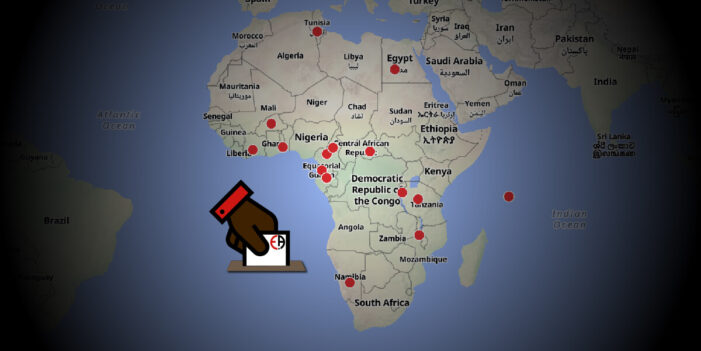Being aware of elections happening across the African continent is crucial for several reasons. Firstly, it fosters a sense of unity and shared purpose among citizens. Additionally, it contributes to the overall progress and development of Africa, our beautiful continent. Here are some key points to consider:
Promoting Democracy and Good Governance
Elections are a fundamental aspect of democracy. By being aware of and participating in elections, as Africans, we can ensure that our leaders are chosen through a transparent and fair process. This promotes accountability and good governance, as elected officials are more likely to act in the best interests of their constituents when they know they are being watched and held accountable.
Encouraging Political Stability
Political stability is essential for economic growth and development – everyone agrees! Free and fair elections can help prevent conflicts and power struggles by providing a legitimate means for leadership transitions. When citizens are aware of and engaged in the electoral process, it reduces the likelihood of disputes and violence, contributing to a more stable political environment.
Upcoming Elections (some dates unconfirmed)
- February 2025: Togo – President
- 5 June 2025: Burundi – National Assembly
- August 2025: Gabon – President + Legislative
- 16 September 2025: Malawi – President + National Assembly
- 27 September 2025: Seychelles – President + National Assembly
- October 2025: Cameroon – President
- October 2025: Côte d’Ivoire – President + National Assembly
- October 2025: Tanzania – President + National Assembly + Zanzibar House Of Representatives + Zanzibar President + Local
- December 2025: Cameroon – Parliament + Local
- December 2025: Central African Republic – Presidential + Parliament
- 2025: Burkina Faso – President + Parliament
- 2025: Egypt – Senate + House of Representatives
- 2025: Equatorial Guinea – Senate + House of Representatives
- 2025: Namibia – Local + Regional Councils
- 2025: Tunisia – House of Councillors
Fostering Regional Cooperation
Awareness of elections in neighboring countries can foster regional cooperation and solidarity. African nations can learn from each other’s experiences, share best practices, and support each other in building stronger democratic institutions. This collective effort can lead to more effective governance and a stronger, more united continent.
Empowering Citizens
Being well informed about elections empowers citizens to make educated decisions about their leaders and policies. It encourages active participation in the democratic process, ensuring that the voices of all citizens are heard. This empowerment can lead to greater civic engagement and a more vibrant democracy across our beautiful continent.
Combating Corruption
Awareness and participation in elections can help combat corruption by promoting transparency and accountability. When citizens are vigilant and informed, they are better equipped to identify and challenge corrupt practices. This can lead to cleaner, more honest governance and a reduction in corruption-related issues.
Driving Economic Development
Political stability and good governance are key drivers of economic development. By ensuring that elections are free and fair, our African nations can create an environment conducive to investment and economic growth. This can lead to job creation, improved infrastructure, and better living standards for all citizens.
Enhancing Social Cohesion
Elections provide an opportunity for citizens to come together and discuss important issues affecting their communities. This can enhance social cohesion and foster a sense of shared purpose. By being aware of and participating in elections, we can, as Africans, work together to address common challenges and build a better future for all.
Strengthening International Relations
Free and fair elections can enhance a country’s reputation on the international stage. By demonstrating a commitment to democratic principles, our African nations can build stronger relationships with other countries and international organizations. This can lead to increased cooperation in areas such as trade, security, and development.
Pan-Africanism and AfCFTA
From a Pan-African perspective, promoting free and fair elections across the continent aligns with the ideals of unity, solidarity, and collective progress. Pan-Africanism emphasizes the importance of cooperation among African nations to achieve social, economic, and political development. By ensuring transparent electoral processes, our African nations can strengthen democratic institutions and foster a culture of accountability and good governance.
The African Continental Free Trade Area (AfCFTA), which aims to create a single continental market for goods and services, is another critical element in this context. Good governance and political stability are essential for the successful implementation of AfCFTA. Transparent and fair electoral processes contribute to a stable political environment, which in turn supports economic growth and regional integration. By promoting free and fair elections, our African nations can create a conducive environment for trade, investment, and development, ultimately benefiting the entire continent.
So as you can see, by staying informed and engaged, Africans can contribute to the growth and progress of their countries and the continent as a whole. Encouraging others to be more aware of elections and to take an active role in the democratic process can lead to a brighter future for Africa. Together, we can build a continent where the voices of all citizens are heard, and where leaders are chosen based on merit and the will of the people.
Encourage others to visit this platform, elections.africa, stay informed and actively participate in the democratic process to help build a better future for the continent.


